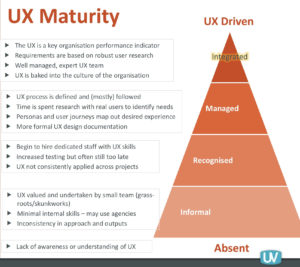Human centred design projects supporting digital transformation of University services
A programme of projects centered around user experience (UX) are now up and running, providing new processes, services and training to key University-wide initiatives.
Late last year it was confirmed that funding had been approved from the University’s Digital Transformation initiative to fund a number of project proposals I developed in collaboration with colleagues across Information Services and Student Experience Services.
We’re now at the point where projects are up and running, with staff in key positions and progress being made on a number of fronts, so I thought it an appropriate moment to share what we’re doing and why.
Previous post: User experience team takes shape (28 February 2017)
The programme of projects are classified as ‘User Experience Services’ although the interrelated projects are delivering new pilot guidelines, training, consultancy, design and development resources, and quality assurance processes.
UX Services programme project descriptions on the IS Project Services website
Why are UX Services needed?
The University is investing a great deal of time and money into programmes of work that will overhaul how we operate in a number of business critical areas, delivering new systems, processes and user experiences. These programmes of work fall under two banners:
- Service Excellence
- Digital Transformation
The intention of the UX Services programme is to support these projects. Longer term, the support, resource and services will extend out to the rest of Information Services and the wider university.
The benefits of adopting a more user-centred approach go way beyond making things more user friendly:
- Increased customer satisfaction with our products by avoiding building things that audiences don’t want
- Reduced user support overheads because products and processes are easier to use and optimized for self service
- Distributed time savings as it becomes quicker to perform tasks
- Faster, cheaper design and development through use of EdGEL
- Greater assurance of compliance with legislation such as accessibility and data privacy
- Reduced development costs, getting more right first time through better communication and specification
About the projects
The umbrella programme of work will last until the end of academic year 2018/19, with the intention of having services and processes embedded as business as usual by this point.
But right now, pilot processes and guidance are in development to be tried out and evolved as we support a range of other projects.
UX services pilot
This project establishes a team to operate on a consultancy basis with other digital transformation and service excellence projects. We’ll pilot a user centred design methodology for the University, and ultimately propose costs and funding models for transition to business as usual.
EdGEL as a service
This project is identifying how EdGEL needs to develop, extending way beyond its initial existence as a repository of the EdWeb-driven website design and code. EdGEL needs to become the repository for the University’s digital experience; much more than a design guide. It needs to exist within service, so that it’s supported and communicated effectively, and so that it grows and evolves through the engagement and involvement of the University’s digital communities. The UX Service and the user-centred design process will help ensure that EdGEL provides resources we can be confident meets business needs and user expectations.
EdGEL technology delivery
For EdGEL to be truly useful to the University’s design and development communities (and any agencies we happen to work with too), it needs the right platform to facilitate easy access, communication, experimentation and feedback. This project will investigate, pilot and propose the model for hosting, usage and technical management of EdGEL.
Student Digital Experience Standards
This project brings a level of quality assurance to our projects, focusing first on developments for our student audiences. We can help to ensure that better, more user-focused products are developed if we appraise how projects are being run, who is being involved and whether guidance like EdGEL is being followed. Again, this is a service that needs to be integrated into business as usual processes.
UX maturity of organisations
I’ve been working on UX-related activities for digital projects for over 15 years now, both at Edinburgh and in other public sector organisations. The fact is, for much of this time, my work has been viewed as an optional add-on. If I hadn’t pushed, it wouldn’t have happened. But with the support of some engaged colleagues, and a bit of leeway in management, I’ve experienced some success.
Rewarding (and frustrating) as these experiences have been at times, to date it’s had limited impact on our organisation as a whole.
But with this funding for 3 years, and sponsorship at more senior levels, we have the chance to move the University on in terms of UX maturity.
There are lots of UX maturity models out there, and this one I think expresses well where we are right now and where we aspire to be over the next few years.

Source: UX Maturity, Abi Reynolds, User Vision
As an organisation, we’ve existed somewhere between Absent and Informal. Within the Website Programme we’ve operated at Recognised, and through this delivered products and services that stand out within the offering of Information Services.
With these UX Service-related projects, we’re initially bringing Information Services more consistently up to the level of Recognised, and by the time the 3 years are up we expect to be functioning at Managed.
If you want to learn more about UX Maturity in organisations, I recommend this article by Tomer Sharon:
Dealing with Difficult People, Teams, and Organizations: A UX Research Maturity Model
Working on a Digital Transformation or Service Excellence project?
If you’d like to learn more about the projects we’re working on and explore how we could help your project deliver more consistent, efficient and user-focused results get in touch with me.


2 replies to “Human centred design projects supporting digital transformation of University services”